|
1. In 'Nightline Report Card' Stephanopoulos Gives Obama the Win
Awarding Barack Obama two grades of A-minus and one B-minus while presenting John McCain with two grades of B-plus and one B-minus, at the end of his "Nightline Report Card" segment on Friday night, ABC's George Stephanopoulos declared Obama the "winner" -- with a big illustrative check mark on screen: "Bottom line, the winner is Barack Obama. He comes into this race where the country wants change. His number one goal was to show that he belonged on that stage. He was a credible commander-in-chief, that he could hold his own on national security. He did that tonight. He gets the win."
2. MSNBC Upset Obama Not Tougher, CBS Shows Only Obama Backer
In the 20 minutes of post-debate analysis before the broadcast networks ended coverage and the cable channels moved on to other shows Friday night, on MSNBC Chris Matthews and Andrea Mitchell fretted that Barack Obama wasn't tough enough in attacking John McCain on the economy as Mitchell also hailed Obama -- "But, boy, he did show a command of foreign policy in terms of the nuts and bolts of it" -- and regretted Obama didn't do more to tie McCain to George Bush, a theme echoed on NBC by Tom Brokaw who "was surprised he didn't work harder at pinning John McCain to the eight years of the Bush administration." CBS featured only one citizen reaction, a man who touted Obama and compared McCain to Nixon, before ending with a quickie poll that found twice as many "uncommitted voters" thought Obama won (40 percent) than McCain (22 percent). Interviewing ABC News reporter turned Obama operative Linda Douglass, Matthews pleaded: "Why did your candidate agree so much -- openly and relentlessly -- with his opponent tonight?" He followed up with an impassioned lecture about Obama's missed opportunities to pound McCain: "Why didn't he talk more about the terrible state of the economy, the jobless rate, unemployment, the degree of deficit we're in right now...?"
3. Chris Matthews Slams John McCain for 'Contempt' Towards Obama
During late night coverage of Friday's presidential debate between Senators Barack Obama and John McCain, Hardball host Chris Matthews attacked the Republican for showing both "contempt" and an "inferiority complex" towards his Democratic opponent. The MSNBC host asked liberal Washington Post columnist Eugene Robinson: "What do you make of what I take as contempt? And I'm not sure contempt is an admirable trait when you're up against an opponent who has every right to be there against you, in fact has equal footing." Before Robinson could answer, Matthews revised the question, asking if this indicated some sort of "inferiority complex" on McCain's part: "He never looked at his opponent. What is that about? Is that an inferiority complex? Is that embarrassment? Is that guilt? Or is it contempt? What is it? It's something." Robinson eagerly agreed, asserting that "this is part of John McCain's style that he, he has to make an opponent into an enemy" and adding that the GOP candidate "almost has to demonize the enemy in order to get into that, that, that fighting stance."
4. MSNBC: 'Troll-Like' McCain 'Crunched Over,' Obama 'Presidential'
During Friday's post-debate coverage on MSNBC, Chris Matthews portrayed Barack Obama as appearing "more presidential" while he complained that John McCain "was crunched over, almost grumpy in physical manner," as he contended that McCain "may not have been presidential." Matthews also complained that McCain did not look at Obama at all during the debate, a theme which Matthews touched on repeatedly: "[McCain] may not have been presidential, however. Not once tonight, in an hour and a half, did he look at his opponent. He was crunched over, almost grumpy in his physical manner. I think a lot of people will take that body language as contemptuous of his opponent. They won't like it. Barack Obama, on the other hand, who kept agreeing with McCain, over and over again, saying I agree with the point you made, I agree with the point you made, looked more presidential, although I believe on points, he gave away too much." Matthews also characterized McCain as "troll-like" and "grumpy," and asked if Americans "really want to put up with four years of that," and described McCain as seeming "really contemptuous" of Obama. Guest John Heilemann contended that McCain "hates Obama." Matthews: "Do people really want to put up with four years of that? Of sitting there angrily, grumpily, like a codger? Like, like, I don't want to push it too far, but didn't he seem really contemptuous of his opponent? Do you want to put up with four years of that?"
5. Media's Morning After Debate Spin: No Winner, So Obama Won
Watching Saturday's network morning shows, the talking heads seemed to agree that Friday night's debate did not produce "a clear winner" or any "knockout punch," and that it was unlikely that any "needle was moved" among undecided voters. Yet those same networks tried to also argue that Obama had really won the debate, superficially suggesting that McCain's "disdainful" body language poorly contrasted with the "warm" and "deferential" Obama. On style, "Barack Obama did a much better job," ABC contributor Matthew Dowd asserted. NBC's Chuck Todd insisted that "McCain barely could look at Obama, was disdainful at times, almost annoyed that he was having to share the same stage....Here was Obama being deferential, and here is McCain being disdainful."
6. CNN & MSNBC Quibble Over McCain's Slip-Up on Ahmadinejad's Name
CNN's Iranian-born chief international correspondent Christiane Amanpour, during the network's post-debate coverage, made fun of John McCain's stumble during the debate concerning the pronunciation of Iranian leader Mahmoud Ahmadinejad's name: "On sort of a cosmetic level, I was quite -- I sort of giggled a little bit when I saw John McCain stumble over Ahmadinejad's name." Almost simultaneously, MSNBC's Keith Olbermann brought up the very same issue with his liberal counterpart Rachel Maddow, who went on to state that the flub "probably does hurt him [McCain] pretty badly." Amanpour made her statement as she was giving her analysis of the debate during a roundtable discussion involving most of CNN's regular political team. Co-host Anderson Cooper stopped her before she could continue on her "cosmetic" note and replied: "Yeah, it's not really fair though. I mean, people make mistakes all the time." Correspondent Michael Ware tried to interject, but Amanpour shot back: "If it's fair for anybody, why not? I mean, if I stumbled, it would be [a] fair comment."
7. Media Jumped on Pro-Obama Poll, But Was the Sample Screwy?
Wednesday morning, ABC News and the Washington Post released a new poll showing Barack Obama leading John McCain by 9 points, 52 to 43 percent. The next day, NBC News and the Wall Street Journal released a poll showing a much tighter race: 48 percent for Obama, 46 percent for McCain. Any guesses as to which poll excited the press more? And which poll has come under fire for over-sampling Democrats? ABC, naturally, reported its own poll on Wednesday's Good Morning America, with Diane Sawyer touting at the top of the broadcast: "Breaking news this morning: Barack Obama gains ground in a new ABC News poll, a nine-point lead over John McCain." Chief Washington correspondent George Stephanopoulos was giddy: "Diane, you have to go back to 1948 for the last time when a candidate, having this kind of a lead in late September, lost."
8. Cafferty Exhibiting Palin Derangement Syndrome, Scolds Blitzer
CNN commentator Jack Cafferty has full-blown Palin Derangement Syndrome. In his latest slam of the Republican vice presidential candidate on Friday's The Situation Room, Cafferty labeled Palin's interview with CBS's Katie Couric "one of the most pathetic pieces of tape I have ever seen from someone aspiring to one of the highest offices in this country," after he played a clip of the Alaska Governor making an awkward reply to a question. He then asked: "Is Governor Sarah Palin qualified to be President?" When host Wolf Blitzer replied to this comment by stating that "she's cramming a lot of information," Cafferty blasted back: "There's no excuse for that! She's supposed to know a little bit of this....You know, don't make excuses for her! That's pathetic." Of course, the CNN commentator only read negative replies to his question near the end of the 4 pm Eastern hour of the CNN program. Since McCain named Palin as his running mate on August 29, Cafferty has devoted 35 percent of his "Questions of the Hour" on The Situation Room to the Alaska Governor, or about once a day.
9. ABC's David Muir Has Trouble Finding Republicans in Mississippi
Good Morning America reporter David Muir on Friday reported live from Mississippi and somehow managed to not feature a single supporter of Senator John McCain, despite the fact that a Research 2000 poll found the Republican candidate maintaining an 18 point lead in the state. In the only allusion to that, Muir began, "In a state considered deeply red, John McCain has family roots here." He then highlighted an Obama supporter: "But those ties aren't enough for Heidi Burell, whose own son is in the Navy. She wants the war to end." In a clip, Ms. Burell hoped that America will regain "respect in the world community."
10. SNL Parodies Rezko and Other Obama Scandals Ignored by Media
When the latest installment of Saturday Night Live parodied Friday's presidential debate, the NBC comedy program gave attention to Barack Obama's connections to convicted criminal Tony Rezko, corrupt Chicago politics, and Obama's recent attempts at "playing the race card," which notably are all matters that the mainstream news media have given little attention. While the show also took a number of shots at John McCain, several times having him propose a bizarre gimmick like challenging Obama to a pie-eating contest, the Illinois Senator also received several noteworthy jabs. One line involved McCain's character, played by Darrell Hammond, referring to Obama, played by Fred Armisen, as making an earmark request titled "Tony Rezko Hush Money." Obama's character also bragged that his tax cut plan would benefit Chicago politicians and city employees "because my plan would not tax income from bribes, kickbacks, shakedowns, embezzlement of government funds, or extortion." The Obama character later promised that he would "play the race card" against dictators like North Korean President Kim Jong Il if necessary to guilt-trip them into dismantling their nuclear programs, as he would accuse Kim of refusing to cooperate with him because "I'm not like the other guys on the $5 and $10 bills."
 In 'Nightline Report Card' Stephanopoulos In 'Nightline Report Card' Stephanopoulos
Gives Obama the Win
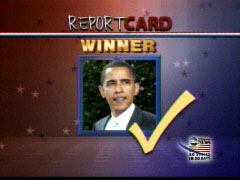 Awarding Barack Obama two grades of A-minus and one B-minus while presenting John McCain with two grades of B-plus and one B-minus, at the end of his "Nightline Report Card" segment on Friday night, ABC's George Stephanopoulos declared Obama the "winner" -- with a big illustrative check mark on screen: "Bottom line, the winner is Barack Obama. He comes into this race where the country wants change. His number one goal was to show that he belonged on that stage. He was a credible commander-in-chief, that he could hold his own on national security. He did that tonight. He gets the win."
Awarding Barack Obama two grades of A-minus and one B-minus while presenting John McCain with two grades of B-plus and one B-minus, at the end of his "Nightline Report Card" segment on Friday night, ABC's George Stephanopoulos declared Obama the "winner" -- with a big illustrative check mark on screen: "Bottom line, the winner is Barack Obama. He comes into this race where the country wants change. His number one goal was to show that he belonged on that stage. He was a credible commander-in-chief, that he could hold his own on national security. He did that tonight. He gets the win."
The grades from the ex-Democratic operative: On "Strategy," Obama an A-minus, John McCain a B-plus; for "Style," Obama another A-minus, McCain another B-plus; and on "Accuracy," Obama got his lowest grade, a B-minus, McCain a B.
[This item, by the MRC's Brent Baker, was posted Saturday morning on the MRC's blog, NewsBusters.org: newsbusters.org ]
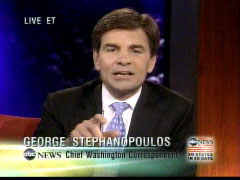 In assessing "strategy," Stephanopoulos trumpeted Obama's performance: "Even better was overcoming the bar on commander-in-chief. He comes in at a significant disadvantage on commander-in-chief. People wonder whether he as this experience to be President, to handle national security and I think on answer after answer after answer, he showed confidence, he showed toughness and he showed he belonged on that stage."
In assessing "strategy," Stephanopoulos trumpeted Obama's performance: "Even better was overcoming the bar on commander-in-chief. He comes in at a significant disadvantage on commander-in-chief. People wonder whether he as this experience to be President, to handle national security and I think on answer after answer after answer, he showed confidence, he showed toughness and he showed he belonged on that stage."
Looking at "style," Stephanopoulos marked down McCain: "John McCain tended not to look either at his opponent, Barack Obama, or at the camera. He tended to address Jim Lehrer so he wasn't looking at the camera. Look at Barack Obama: He looked straight at the camera, he also was willing to engage John McCain again and again and I think he got the advantage there, so A-minus for Barack Obama, B-plus for McCain."
Full transcript of the segment on the Friday, September 26 Nightline:
TERRY MORAN: George Stephanopoulos joins us to grade tonight's action in the Nightline Report Card. All right, George, let's -- how you doing tonight?
GEORGE STEPHANOPOULOS: Good, thank you.
MORAN: Let's start with their approaches. The approach that each candidate took, strategy. What are the grades?
STEPHANOPOULOS: Barack Obama A-minus, John McCain B-plus. Each of them had an offensive and a defensive strategy tonight. Let's take Obama first. On offense, he had to try to tie John McCain to George Bush and I thought he did that relatively effectively on the economy, particularly at the beginning. But even better was overcoming the bar on commander-in-chief. He comes in at a significant disadvantage on commander-in-chief. People wonder whether he as this experience to be President, to handle national security and I think on answer after answer after answer, he showed confidence, he showed toughness and he showed he belonged on that stage.
For John McCain, he also had two goals. On one, he had to try to tarnish Barack Obama on the issue of -- the question of experience, the question of judgment. He used the words often. How many times did he say Barack Obama doesn't understand. I think where he didn't do enough, even though he did a good job at showing how he was different from President Bush in the past, I don't think John McCain did enough going forward to show how he would take the country in a different direction. That's why I think Barack Obama gets the edge here. A-minus for Obama, B-plus for McCain.
MORAN: Okay, how about the intangibles, that's the substance, how about the style? What are the grades there.
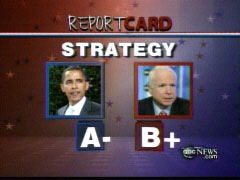 STEPHANOPOULOS: Again, Barack Obama A-minus, John McCain B-plus. Let's take McCain first. He did do a good job. As you pointed out in your piece, he was crisp and he was declarative. I also thought he did a very good job at bringing out emotion over the course of the debate in telling stories, weaving that. But, and I want to show some of this here, John McCain tended not to look either at his opponent, Barack Obama, or at the camera. He tended to address Jim Lehrer so he wasn't looking at the camera. Look at Barack Obama: He looked straight at the camera, he also was willing to engage John McCain again and again and I think he got the advantage there, so A-minus for Barack Obama, B-plus for McCain. STEPHANOPOULOS: Again, Barack Obama A-minus, John McCain B-plus. Let's take McCain first. He did do a good job. As you pointed out in your piece, he was crisp and he was declarative. I also thought he did a very good job at bringing out emotion over the course of the debate in telling stories, weaving that. But, and I want to show some of this here, John McCain tended not to look either at his opponent, Barack Obama, or at the camera. He tended to address Jim Lehrer so he wasn't looking at the camera. Look at Barack Obama: He looked straight at the camera, he also was willing to engage John McCain again and again and I think he got the advantage there, so A-minus for Barack Obama, B-plus for McCain.
MORAN: And just a follow-up on that, George, quickly. That visual contrast that's up there, that's historic really. Black, white, an older man, Barack Obama 47. What do you make of that?
STEPHANOPOULOS: Barack Obama a little taller, John McCain a little shorter. Generally the taller candidate wins for President. But there's something else going on here. I'm not sure if it was our monitor and I can't wait to see what people at home thought about this. It did appear that John McCain, at times, was looking a little more washed out than you might expect. And Barack Obama, and maybe I was wrong, but we were talking about it up here on the set, sometimes it seemed like the lighting on him was even darker than he appears in person. I'm wondering if people saw that at home as well.
MORAN: The perils of the makeup artist as you know as we both know there, George. How about accuracy. A lot of claims out there, what are the grades?
STEPHANOPOULOS: So many it's hard to sort them through all. But let's look at the grades. For Barack Obama, B-minus, John McCain a B. Again, they both were in the range for politicians. I think McCain had a trivial error when he told the story about Eisenhower's letters, he didn't actually say he'd resign, whether he wrote a letter of resignation before D-Day. He also said that Barack Obama would have the government take over the health care. That's not the Obama plan. But on the points where there's more engagement, I think Barack Obama had a little more trouble. He said that Admiral Mullen did not say his time line was dangerous, Admiral Mullen in fact did say that. They had a big dispute over whether Henry Kissinger wanted direct talks with Iran. He does want direct talks with Iran, but not at the presidential level, at the level of Secretary of State. So I give a little bit of an edge here because more time was spent on the areas where Barack Obama was a little less accurate than John McCain.
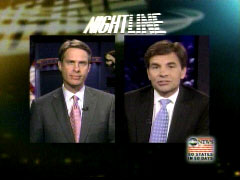 MORAN: Bottom line? MORAN: Bottom line?
STEPHANOPOULOS: Bottom line, the winner is Barack Obama. He comes into this race where the country wants change. His number one goal was to show that he belonged on that stage. He was a credible commander in chief, that he could hold his own on national security. He did that tonight. He gets the win.
MORAN: All right. George Stephanopoulos declaring Barack Obama the winner. I might have gone a little bit the other way. I'm not sure.
  MSNBC Upset Obama Not Tougher, CBS Shows MSNBC Upset Obama Not Tougher, CBS Shows
Only Obama Backer
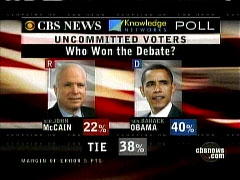 In the 20 minutes of post-debate analysis before the broadcast networks ended coverage and the cable channels moved on to other shows Friday night, on MSNBC Chris Matthews and Andrea Mitchell fretted that Barack Obama wasn't tough enough in attacking John McCain on the economy as Mitchell also hailed Obama -- "But, boy, he did show a command of foreign policy in terms of the nuts and bolts of it" -- and regretted Obama didn't do more to tie McCain to George Bush, a theme echoed on NBC by Tom Brokaw who "was surprised he didn't work harder at pinning John McCain to the eight years of the Bush administration." CBS featured only one citizen reaction, a man who touted Obama and compared McCain to Nixon, before ending with a quickie poll (neither ABC or NBC had one) that found twice as many "uncommitted voters" thought Obama won (40 percent) than McCain (22 percent).
In the 20 minutes of post-debate analysis before the broadcast networks ended coverage and the cable channels moved on to other shows Friday night, on MSNBC Chris Matthews and Andrea Mitchell fretted that Barack Obama wasn't tough enough in attacking John McCain on the economy as Mitchell also hailed Obama -- "But, boy, he did show a command of foreign policy in terms of the nuts and bolts of it" -- and regretted Obama didn't do more to tie McCain to George Bush, a theme echoed on NBC by Tom Brokaw who "was surprised he didn't work harder at pinning John McCain to the eight years of the Bush administration." CBS featured only one citizen reaction, a man who touted Obama and compared McCain to Nixon, before ending with a quickie poll (neither ABC or NBC had one) that found twice as many "uncommitted voters" thought Obama won (40 percent) than McCain (22 percent).
Interviewing ABC News reporter turned Obama operative Linda Douglass, Matthews pleaded: "Why did your candidate agree so much -- openly and relentlessly -- with his opponent tonight?" He followed up with an impassioned lecture about Obama's missed opportunities to pound McCain: "Why didn't he talk more about the terrible state of the economy, the jobless rate, unemployment, the degree of deficit we're in right now, the degree of national debt, all of those issues out there that effect the average person, the number of foreclosures? He let his opponent talk about taxes and earmarking, his specialties. He seemed to lose control of the economic topic."
MSNBC did not air a representative from the McCain campaign before the network switched to Keith Olbermann's tirades on a live Countdown at 11 PM EDT.
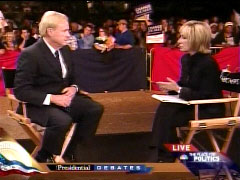 Following Douglass, Matthews went to NBC News reporter Andrea Mitchell, who rued: "I think he should have turned away from taxes and earmarks very quickly and really hammered away on George Bush and on what this $700 billion or $1 trillion problem really means for average people."
Following Douglass, Matthews went to NBC News reporter Andrea Mitchell, who rued: "I think he should have turned away from taxes and earmarks very quickly and really hammered away on George Bush and on what this $700 billion or $1 trillion problem really means for average people."
Matthews then reminded viewers: "He said at the convention, in accepting the nomination, he was going to make John McCain own the failures of the last seven and eight years, and he didn't do it tonight. He didn't focus on those failures."
Mitchell agreed, then pivoted to praise: "But, boy, he did show a command of foreign policy in terms of the nuts and bolts of it. And, of course, that is the expertise of John McCain."
[This item, by the MRC's Brent Baker, was posted late Friday night on the MRC's blog, NewsBusters.org: newsbusters.org ]
A little earlier, the MRC's Brad Wilmouth noticed, Mitchell complained about Obama: "He could have tried to tie John McCain more closely to George Bush."
Matching that theme, on NBC Tom Brokaw lamented: "I thought Senator Obama missed a couple of opportunities in the earlier economic debate. I would have expected him to talk a little more about the need for regulations on Wall Street, governing these banks and the kinds of transactions that took place. And I was surprised he didn't work harder at pinning John McCain to the eight years of the Bush administration."
Shortly after the debate ended, CBS went to Byron Pitts at CBS television show test center at the MGM Grand in Las Vegas where he was with one hundred "undecided voters" who used dials to react to each candidate during the debate. The camera view only showed a few of the participants, but when Pitts asked who they thought won the debate, more hands went up for Obama than McCain.
Pitts selected just one person to give their reaction, an Obama supporter from Chicago who contended: "I thought, it reminded me a little bit of the Kennedy-Nixon debate. Obama came across very relaxed, very articulate. Senator McCain came across just like Richard Nixon, a little bit stressed. He showed much more emotion than Obama did."
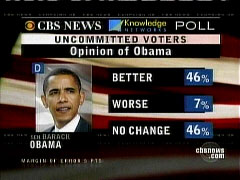 To end the 20 minutes, just before 11 PM EDT anchor Katie Couric went to Sharyl Attkisson for results from a CBS News/Knowledge Networks "poll of approximately 500 uncommitted voters." She highlighted several results, starting with how on who won 40 percent said Obama, 22 percent replied McCain and 38 percent considered it a tie; and ending with how 46 percent said their opinion of Barack Obama has gotten better compared to just 7 percent whose opinion grew worse.
To end the 20 minutes, just before 11 PM EDT anchor Katie Couric went to Sharyl Attkisson for results from a CBS News/Knowledge Networks "poll of approximately 500 uncommitted voters." She highlighted several results, starting with how on who won 40 percent said Obama, 22 percent replied McCain and 38 percent considered it a tie; and ending with how 46 percent said their opinion of Barack Obama has gotten better compared to just 7 percent whose opinion grew worse.
She didn't provide a number for McCain, perhaps because she ran out of time, but the CBSNews.com posting provided an answer: "Thirty-two percent said their opinion of McCain got better." See: www.cbsnews.com
Highlights from MSNBC between 10:40 and 10:59 PM EDT, as gathered by Brad Wilmouth:
ANDREA MITCHELL: Yeah, I think that Barack Obama missed opportunities, on the economic issues, to show more of a connection. He let the debate focus on taxes and budget cuts, rather than on pocketbook issues that are of key concern not only to Democratic voters, but independent voters, swing voters. So I think he could have been punchier on that. He could have tried to tie John McCain more closely to George Bush. On foreign policy, Obama certainly looked as though he were conversant. He had all the facts at his command. But, again, John McCain was dismissive toward him several times, calling him naive ‚€" you don't understand tactics, you don't understand strategy‚€" trying to diminish him in the eyes of the viewers and, of course, the voters. And I'm not sure whether that was something that people will find offensive, frankly.
....
MATTHEWS: Linda, my friend, why did your candidate agree so much -- openly and relentlessly -- with his opponent tonight?
LINDA DOUGLASS, OBAMA SENIOR ADVISER: Well, I think there were several areas of agreement, and I think the American people are looking for a new kind of politics where there are not automatic, knee-jerk, partisan responses. When there's agreement to be made, you should acknowledge that. That's the way that a President Obama would operate in a bipartisan Washington.
MATTHEWS: Second question: Why didn't he talk more about the terrible state of the economy, the jobless rate, unemployment, the degree of deficit we're in right now, the degree of national debt, all of those issues out there that effect the average person, the number of foreclosures? He let his opponent talk about taxes and earmarking, his specialties. He seemed to lose control of the economic topic.
DOUGLASS: Oh, I think that's not, I wouldn't agree with that at all, Chris. I mean, I think he made it very clear, and the reason that we think that he won this debate tonight is he made it very clear that he's the one who's going to bring change to the domestic economy. He's the one who's going to be the advocate for the struggling middle class families who can't afford to send their kids to college, who can't afford gas, who can't afford the high price of food even. He's made it very clear that he's going to provide a middle class tax cut, affordable college, accessible, affordable health care, a new energy economy. And John McCain made it very clear that he's going to continue doing exactly what George Bush has done over the last eight years, the very policies that have sucked us into an economic disaster.
MATTHEWS: Linda, thank you very much. We're out of time. Thank you very much. Senior policy advisor Linda Douglass, with the Barack Obama campaign, thanks for joining us tonight. There you have the spin. They did think they made the case on the economy. You and I, I think, agree they lost a bit of the edge they should have enjoyed.
MITCHELL: I think he should have turned away from taxes and earmarks very quickly and really hammered away on George Bush and on what this $700 billion or $1 trillion problem really means for average people.
MATTHEWS: He said at the convention, in accepting the nomination, he was going to make John McCain own the failures of the last seven and eight years, and he didn't do it tonight. He didn't focus on those failures.
MITCHELL: I think he could have been more combative. He seemed to be more genial than you might have expected. But, boy, he did show a command of foreign policy in terms of the nuts and bolts of it. And, of course, that is the expertise of John McCain.
  Chris Matthews Slams John McCain for Chris Matthews Slams John McCain for
'Contempt' Towards Obama
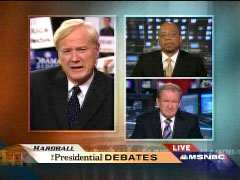 During late night coverage of Friday's presidential debate between Senators Barack Obama and John McCain, Hardball host Chris Matthews attacked the Republican for showing both "contempt" and an "inferiority complex" towards his Democratic opponent. The MSNBC host asked liberal Washington Post columnist Eugene Robinson: "What do you make of what I take as contempt? And I'm not sure contempt is an admirable trait when you're up against an opponent who has every right to be there against you, in fact has equal footing."
During late night coverage of Friday's presidential debate between Senators Barack Obama and John McCain, Hardball host Chris Matthews attacked the Republican for showing both "contempt" and an "inferiority complex" towards his Democratic opponent. The MSNBC host asked liberal Washington Post columnist Eugene Robinson: "What do you make of what I take as contempt? And I'm not sure contempt is an admirable trait when you're up against an opponent who has every right to be there against you, in fact has equal footing."
Before Robinson could answer, Matthews revised the question, asking if this indicated some sort of "inferiority complex" on McCain's part: "He never looked at his opponent. What is that about? Is that an inferiority complex? Is that embarrassment? Is that guilt? Or is it contempt? What is it? It's something." Robinson eagerly agreed, asserting that "this is part of John McCain's style that he, he has to make an opponent into an enemy" and adding that the GOP candidate "almost has to demonize the enemy in order to get into that, that, that fighting stance."
[This item, by the MRC's Scott Whitlock, was posted Friday night on the MRC's blog, NewsBusters.org: newsbusters.org ]
About five minutes later, Matthews returned to the topic. He interviewed Mississippi Congressman Chip Pickering and complained, "Congressman, it may be a small point to some, but anyone who has ever engaged in debating knows that you must address your opponent. If you're an attorney, a prosecutor, you must point to the defendant. You must do it. You can't ignore them physically. John McCain did not look at his opponent tonight. How do you explain that?" Pickering responded by claiming McCain simply was focusing on the questions and the substance. Fixating on the subject, Matthews followed up and fretted, "Every time a question came up, they were told to talk to each other, have a debate between each other. Why couldn't John McCain do that? Why did he choose not to do that?"
A transcript of the exchanges, which occurred around 12:15am on Friday night/Saturday morning September 27:
CHRIS MATTHEWS: Let me ask Gene, why, before I lose you tonight: What do you make of what I take as contempt? And I'm not sure contempt is an admirable trait when you're up against an opponent who has every right to be there against you, in fact has equal footing. He won the nomination of the other party, to treat your opponent with such contempt that not once throughout the evening do you give him the courtesy of looking at him? He was supposed to, as part of the format of this debate, five minutes with each exchange, to exchange a discussion with his opponent, to share thoughts, to challenge the opponent. He never looked at his opponent. What is that about? Is that an inferiority complex? Is that embarrassment? Is that guilt? Or is it contempt? What is it? It's something.
EUGENE ROBINSON, Washington Post: Well, you know, look- It's up to- Only John McCain knows whether it's genuine contempt. Here's my theory, is that, is that this is part of John McCain's style that he, he has to make an opponent into an enemy, you know, in his mind, to kind of, you know, to kind of get up for this. He personalizes conflict as we all know and tends to put himself at the center of it. And, and, you know, it's a window into his style. He almost has to demonize the enemy in order to get into that, that, that fighting stance.
MATTHEWS: Yeah.
ROBINSON: You know, I think it came right through the screen. It looked like contempt and anger and that usually does not play well in these debates.
....
MATTHEWS TO CONGRESSMAN CHIP PICKERING: Congressman, it may be a small point to some, but anyone who has ever engaged in debating knows that you must address your opponent. If you're an attorney, a prosecutor, you must point to the defendant. You must do it. You can't ignore them physically. John McCain did not look at his opponent tonight. How do you explain that?
....
MATTHEWS TO CONGRESSMAN CHIP PICKERING: Well, what do you make about the format? The format was supposed to be five minutes on each topic. Every time a question came up, they were told to talk to each other, have a debate between each other. Why couldn't John McCain do that? Why did he choose not to do that?
  MSNBC: 'Troll-Like' McCain 'Crunched MSNBC: 'Troll-Like' McCain 'Crunched
Over,' Obama 'Presidential'
During Friday's post-debate coverage on MSNBC, Chris Matthews portrayed Barack Obama as appearing "more presidential" while he complained that John McCain "was crunched over, almost grumpy in physical manner," as he contended that McCain "may not have been presidential." Matthews also complained that McCain did not look at Obama at all during the debate, a theme which Matthews touched on repeatedly: "[McCain] may not have been presidential, however. Not once tonight, in an hour and a half, did he look at his opponent. He was crunched over, almost grumpy in his physical manner. I think a lot of people will take that body language as contemptuous of his opponent. They won't like it. Barack Obama, on the other hand, who kept agreeing with McCain, over and over again, saying I agree with the point you made, I agree with the point you made, looked more presidential, although I believe on points, he gave away too much."
Matthews also characterized McCain as "troll-like" and "grumpy," and asked if Americans "really want to put up with four years of that," and described McCain as seeming "really contemptuous" of Obama. Guest John Heilemann contended that McCain "hates Obama." Matthews: "Do people really want to put up with four years of that? Of sitting there angrily, grumpily, like a codger? Like, like, I don't want to push it too far, but didn't he seem really contemptuous of his opponent? Do you want to put up with four years of that?"
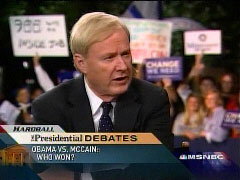 Ironically, about 14 minutes after Matthews's criticism that McCain was "crunched over," former Democratic Congressman and MSNBC political analyst Harold Ford advised Obama to "lean forward a little more." Ford: "One of the things that Senator Obama has probably got to do better going forward here and even in the next debate, is lean forward a little more. It's funny because, interestingly, because his running mate, Joe Biden, has probably got to lean back just a little bit in his debate with Sarah Palin."
Ironically, about 14 minutes after Matthews's criticism that McCain was "crunched over," former Democratic Congressman and MSNBC political analyst Harold Ford advised Obama to "lean forward a little more." Ford: "One of the things that Senator Obama has probably got to do better going forward here and even in the next debate, is lean forward a little more. It's funny because, interestingly, because his running mate, Joe Biden, has probably got to lean back just a little bit in his debate with Sarah Palin."
[This item, by the MRC's Brad Wilmouth, was posted Saturday on the MRC's blog, NewsBusters.org: newsbusters.org ]
Below is a transcript of relevant portions of the Friday, September 26, coverage of the presidential debate from MSNBC:
10:40pm EDT:
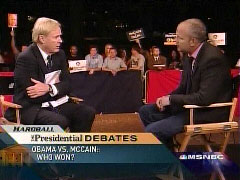 CHRIS MATTHEWS: What struck me is the stylistic difference. He was very strong. He was very strong, McCain, very practical, very emotional He hit a lot of people as a very practical man tonight. He may not have been presidential, however. Not once tonight, in an hour and a half, did he look at his opponent. He was crunched over, almost grumpy in his physical manner. I think a lot of people will take that body language as contemptuous of his opponent. They won't like it. Barack Obama, on the other hand, who kept agreeing with McCain, over and over again, saying I agree with the point you made, I agree with the point you made, looked more presidential, although I believe on points, he gave away too much. I want to bring in Andrea Mitchell right now with your thoughts.
CHRIS MATTHEWS: What struck me is the stylistic difference. He was very strong. He was very strong, McCain, very practical, very emotional He hit a lot of people as a very practical man tonight. He may not have been presidential, however. Not once tonight, in an hour and a half, did he look at his opponent. He was crunched over, almost grumpy in his physical manner. I think a lot of people will take that body language as contemptuous of his opponent. They won't like it. Barack Obama, on the other hand, who kept agreeing with McCain, over and over again, saying I agree with the point you made, I agree with the point you made, looked more presidential, although I believe on points, he gave away too much. I want to bring in Andrea Mitchell right now with your thoughts.
ANDREA MITCHELL: Yeah, I think that Barack Obama missed opportunities, on the economic issues, to show more of a connection. He let the debate focus on taxes and budget cuts, rather than on pocketbook issues that are of key concern to not only Democratic voters, but independent voters, swing voters. So I think he could have been punchier on that. He could have tried to tie John McCain more closely to George Bush. On foreign policy, Obama certainly looked as though he were conversant. He had all the facts at his command. But, again, John McCain was dismissive toward him several times, calling him naive ‚€" you don't understand tactics, you don't understand strategy‚€" trying to diminish him in the eyes of the viewers and, of course, the voters. And I'm not sure whether that was something that people would find offensive, frankly.
MATTHEWS: And that, I think we agree on that. David, back to you. The big question is, will his obvious contempt in both his wording and his body language towards his rival offend people or give him a sense of strength? We'll have to see.
...
10:54pm EDT:
HAROLD FORD: One of the things that Senator Obama has probably got to do better going forward here and even in the next debate, is lean forward a little more. It's funny because, interestingly, because his running mate, Joe Biden, has probably got to lean back just a little bit in his debate with Sarah Palin.
# From a special midnight EDT edition of Hardball:
12:41am EDT:
MATTHEWS: Let's talk TV values, because in many ways, subconsciously, when you pick a candidate for President, you not only pick him on, not just on issues, but who do you want to listen to for four to eight years? I mean, it really is part of the way we look at these things. Do you think, let's start with John McCain, do you think he was too troll-like tonight? You know, too much of a troll?
JOHN HEILEMANN, NEW YORK MAGAZINE, LAUGHING: Yeah.
MATTHEWS: Seriously.
HEILEMANN: No, no, I understand.
MATTHEWS: Do people really want to put up with four years of that? Of sitting there angrily, grumpily, like a codger? Like, like, I don't want to push it too far, but didn't he seem really contemptuous of his opponent? Do you want to put up with four years of that?
HEILEMANN: He did. He did. And, you know, and he hates, and he hates, and he hates Obama, and maybe ... [PORTION IS DIFFICULT TO HEAR] ... since Obama's not on the stage, that we won't have to put up with that anymore.
MATTHEWS: Excuse me. That's what he thinks of the press.
HEILEMANN: I know. That's what he thinks of almost anybody who's not John McCain.
MATTHEWS: Is every press conference going to be like that? A troll-like performance, angry at the world?
  Media's Morning After Debate Spin: No Media's Morning After Debate Spin: No
Winner, So Obama Won
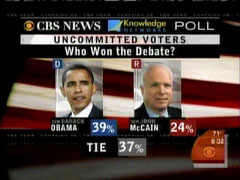 Watching Saturday's network morning shows, the talking heads seemed to agree that Friday night's debate did not produce "a clear winner" or any "knockout punch," and that it was unlikely that any "needle was moved" among undecided voters. Yet those same networks tried to also argue that Obama had really won the debate, superficially suggesting that McCain's "disdainful" body language poorly contrasted with the "warm" and "deferential" Obama.
Watching Saturday's network morning shows, the talking heads seemed to agree that Friday night's debate did not produce "a clear winner" or any "knockout punch," and that it was unlikely that any "needle was moved" among undecided voters. Yet those same networks tried to also argue that Obama had really won the debate, superficially suggesting that McCain's "disdainful" body language poorly contrasted with the "warm" and "deferential" Obama.
On style, "Barack Obama did a much better job," ABC contributor Matthew Dowd asserted. NBC's Chuck Todd insisted that "McCain barely could look at Obama, was disdainful at times, almost annoyed that he was having to share the same stage....Here was Obama being deferential, and here is McCain being disdainful."
[This item, by the MRC's Rich Noyes, was posted Saturday afternoon on MRC's blog, NewsBusters.org: newsbusters.org ]
Friday night on CNN, a snap poll of 524 adults who watched the debate suggested more thought Obama had won, by a 51% to 38% margin. But CNN correspondent John King cautioned that the poll was heavy with Democratic viewers: "Looking at our poll...the audience watching has a higher percentage of Democrats than the country as a whole."
King's colleague Jeffrey Toobin, however, suggested that the polls would push the country into accepting Obama as the true winner: "Once one side is established as the winner, it becomes a self-fulfilling prophecy....It is very important, I think, that the first objective analysis -- you know, not from us, but from polls, and I think it's consistent across the networks -- all show Obama winning."
 The only other network to poll a random sample last night was CBS, which selected 483 "previously uncommitted" voters to respond via the Internet. Saturday's Early Show twice touted the results of that poll, but the numbers were inexplicably different than those announced by CBS Friday night when CBS had Obama "winning" by a 40% to 22% margin (see #2 above); by this morning, the poll results had curiously changed to 39% for Obama and 24% for McCain.
The only other network to poll a random sample last night was CBS, which selected 483 "previously uncommitted" voters to respond via the Internet. Saturday's Early Show twice touted the results of that poll, but the numbers were inexplicably different than those announced by CBS Friday night when CBS had Obama "winning" by a 40% to 22% margin (see #2 above); by this morning, the poll results had curiously changed to 39% for Obama and 24% for McCain.
Here's a rundown of some of Saturday morning's coverage, plus the exchange on CNN last night when they disclosed their own survey showing Obama winning, beginning with the 11:30pm EDT exchange on CNN:
# CNN post-debate coverage, September 26:
ANDERSON COOPER: We've just conducted a telephone poll, a CNN-Opinion Research poll -- 524 adult Americans surveyed by the telephone. First question, who did the best job in the debate? Obama 51%, John McCain, 38%. Next question was, who would better handle Iraq? The answer to that: Obama, 52% to John McCain's 47%. And then the third question, who would better handle the economy? 58% for Obama, 37% of respondents said John McCain. What do you make of that, John King?
JOHN KING: Well, one thing looking at our poll is that, what the pollsters are saying, is that the audience watching has a higher percentage of Democrats than the country as a whole. So it will be interesting -- we'll be watching other organizations' polls to see if Democrats tuned into the debate, and what are the reasons for that. But certainly, if you have these headlines tomorrow that say the polls say Obama won, that certainly helps Barack Obama....
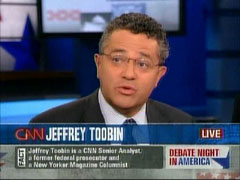 JEFFREY TOOBIN: What is significant, I think, about these polls is there tends to be a multiplier effect when these -- about these debates. That, initially, people aren't quite sure, but once one side is established as the winner, it becomes a self-fulfilling prophecy....It is very important, I think, that the first objective analysis -- you know, not from us, but from polls, and I think it's consistent across the networks -- all show Obama winning. JEFFREY TOOBIN: What is significant, I think, about these polls is there tends to be a multiplier effect when these -- about these debates. That, initially, people aren't quite sure, but once one side is established as the winner, it becomes a self-fulfilling prophecy....It is very important, I think, that the first objective analysis -- you know, not from us, but from polls, and I think it's consistent across the networks -- all show Obama winning.
# ABC Good Morning America, September 27
BILL WEIR: For analysis on all this now, joining us ABC News political contributor Matthew Dowd....Did you see a clear winner last night?
MATTHEW DOWD: I don't think there was a clear winner, but I think you'd have to give the possession of the debate to Barack Obama. He went in with a lead. If you look at this as a 12th or 13th round of a prize fight, he's still ahead on points afterwards. John McCain tried to knock him off balance a bit. It didn't happen. So, slight edge, I think, in the end to Barack Obama. And he comes out of it -- goes into it with a lead and comes out with a lead.
WEIR: How about demeanor and tone? It was interesting that Obama made two points of contact -- it took him a while -- but it was the camera and John McCain. Whereas McCain seemed focused on the moderator.
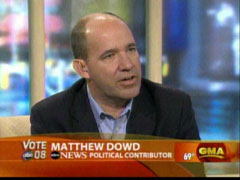 DOWD: Yeah, that was an interesting thing. Most, you know -- debates are judged by the American public by substance and by style and how you connect with the audience. And I think on that regard, Barack Obama did a much better job. He, as you say, he looked at the camera. He smiled. He actually, you know, gave John McCain -- he said 'John McCain is right' a number of times. John McCain never said that to Barack Obama. And just his body language was, he was not going to look -- either somebody told him or he decided he was not going to look at Barack Obama. And I don't think in a debate, in front of the American public, that is a good thing. They want somebody that warms up. And I think Barack Obama did that. DOWD: Yeah, that was an interesting thing. Most, you know -- debates are judged by the American public by substance and by style and how you connect with the audience. And I think on that regard, Barack Obama did a much better job. He, as you say, he looked at the camera. He smiled. He actually, you know, gave John McCain -- he said 'John McCain is right' a number of times. John McCain never said that to Barack Obama. And just his body language was, he was not going to look -- either somebody told him or he decided he was not going to look at Barack Obama. And I don't think in a debate, in front of the American public, that is a good thing. They want somebody that warms up. And I think Barack Obama did that.
# CBS's Saturday Early Show, September 27:
CO-HOST ERICA HILL, 8am EDT: Senators Barack Obama and John McCain squaring off for the first time at the University of Mississippi, but did either candidate land that knockout punch? A new CBS News poll taken right after the debate finds that among previously uncommitted voters, Obama won the verbal match, 39 to 24 percent. 37% of those polled thought it was a tie.
PRIYA DAVID, 8:30am news update: The presidential candidates faced off in their first televised debate last night. It was supposed to be about foreign policy, but the Wall Street bailout played a major role. The debate was held at the Univesity of Mississippi. While the pundits seemed to agree there was no knockout punch, a new CBS News poll of previously uncommitted voters had Barack Obama as the winner.
# NBC's Today, September 27:
LESTER HOLT: Did these debates move any needles, in your view?
CHUCK TODD: Well, I'd be really surprised if any needle was moved....They were both very good at doing what they do well. Obama being a little more direct than he usually is, but still expansive, and the format helped him there. McCain being very direct, showing a lot of energy, and they presented two very divergent views on foreign policy. I mean, it is not as if a voter could sit there and say, geez, these guys are sounding alike. They did not sound alike at all....
TODD: I was struck by the two different ways that they handled each other. Obama very much was trying to be deferential -- he did this a lot in this primary debates. He would say 'Hillary was right,' or he would say 'Joe was right.'...Take that and compare it to where McCain barely could look at Obama, was disdainful at times, almost annoyed that he was having to share the same stage, that he was being compared on his presidential mettle versus Obama's presidential mettle. And that's -- you wonder, how is that tone playing? You know, a lot of times, tone can dictate how a voter feels about a debate. Here was Obama being deferential, and here is McCain being disdainful. We'll see -- it is an angry public out there right now, so maybe they'll connect with disdainful, but a lot of times that isn't the case.
  CNN & MSNBC Quibble Over McCain's Slip-Up CNN & MSNBC Quibble Over McCain's Slip-Up
on Ahmadinejad's Name
CNN's Iranian-born chief international correspondent Christiane Amanpour, during the network's post-debate coverage, made fun of John McCain's stumble during the debate concerning the pronunciation of Iranian leader Mahmoud Ahmadinejad's name: "On sort of a cosmetic level, I was quite -- I sort of giggled a little bit when I saw John McCain stumble over Ahmadinejad's name." Almost simultaneously, MSNBC's Keith Olbermann brought up the very same issue with his liberal counterpart Rachel Maddow, who went on to state that the flub "probably does hurt him [McCain] pretty badly."
Amanpour made her statement as she was giving her analysis of the debate during a roundtable discussion involving most of CNN's regular political team. Co-host Anderson Cooper stopped her before she could continue on her "cosmetic" note and replied: "Yeah, it's not really fair though. I mean, people make mistakes all the time." Correspondent Michael Ware tried to interject, but Amanpour shot back: "If it's fair for anybody, why not? I mean, if I stumbled, it would be [a] fair comment."
[This item, by the MRC's Matthew Balan, was posted late Friday night, with video, on the MRC's blog, NewsBusters.org: newsbusters.org ]
Olbermann brought up McCain's slip-up at nearly the same point in time as Amanpour did, about 10 minutes into the 11 pm Eastern hour of the post-debate Countdown program. He asked Maddow: "What happens when you -- when you make mistakes like the inability -- and you and I both know this very well -- it's a very tough name to pronounce, Ahmadinejad." As Maddow nodded her head in agreement to this sentiment, he continued: "But if you then get the name of the President of Pakistan wrong and call his country a failed state, and then sort of -- just sort of let slide this idea, we're never going to torture again, parentheses -- anybody at home watching, we must have tortured before. Did he -- did he seem to be the master of international affairs, and Obama the novice, or maybe the other way around?"
Maddow responded by lauding Obama's debate performance: "Well, I think that there was such high expectations for McCain in terms of getting everything right on foreign policy, because is supposed to be -- that's supposed to be his wheelhouse; that's supposed to be the place from which he has the greatest strength. So getting a few things wrong there, even it is mispronouncing a difficult name, probably does hurt him pretty badly. Barack Obama didn't have any obvious gaffes of those kinds.
"But honestly, I think because this is the first of three debates; because it was very long and very dense, and had no breaks -- probably the way most people are going to interpret this is with the juiciest sound bites that get played over and over again, and honestly I think the juiciest sound bites in this debate were attacks by Barack Obama against John McCain. When he said over and over again -- on Iraq, you were wrong. You said we would be greeted as liberators -- you were wrong. You said it would be easy -- you were wrong. That was probably the best sound bite of the entire night. That may be the thing that lives on past this debate."
  Media Jumped on Pro-Obama Poll, But Was Media Jumped on Pro-Obama Poll, But Was
the Sample Screwy?
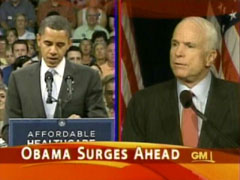 Wednesday morning, ABC News and the Washington Post released a new poll showing Barack Obama leading John McCain by 9 points, 52 to 43 percent. The next day, NBC News and the Wall Street Journal released a poll showing a much tighter race: 48 percent for Obama, 46 percent for McCain.
Wednesday morning, ABC News and the Washington Post released a new poll showing Barack Obama leading John McCain by 9 points, 52 to 43 percent. The next day, NBC News and the Wall Street Journal released a poll showing a much tighter race: 48 percent for Obama, 46 percent for McCain.
Any guesses as to which poll excited the press more? And which poll has come under fire for over-sampling Democrats?
[This item, by the MRC's Rich Noyes, was posted Friday afternoon on the MRC's blog, NewsBusters.org: newsbusters.org ]
ABC, naturally, reported its own poll on Wednesday's Good Morning America, with Diane Sawyer touting at the top of the broadcast: "Breaking news this morning: Barack Obama gains ground in a new ABC News poll, a nine-point lead over John McCain."
Chief Washington correspondent George Stephanopoulos was giddy: "Diane, you have to go back to 1948 for the last time when a candidate, having this kind of a lead in late September, lost."
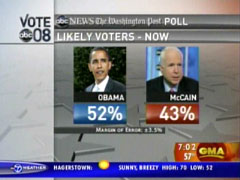 The ABC poll was so thrilling to journalists, it was also part of the political discussion on CBS and NBC that same morning. CBS's Harry Smith confronted Republican Karen Hughes: "We look at brand new poll numbers this morning, nationwide poll numbers, and all of a sudden Barack Obama has jumped out to this nine-point lead."
The ABC poll was so thrilling to journalists, it was also part of the political discussion on CBS and NBC that same morning. CBS's Harry Smith confronted Republican Karen Hughes: "We look at brand new poll numbers this morning, nationwide poll numbers, and all of a sudden Barack Obama has jumped out to this nine-point lead."
And NBC's Today made room for their competitors' poll in their news round-up. "The financial crisis is the number one issue concerning voters, according to a new poll out this morning. It shows Barack Obama gaining ground over John McCain in the race for the White House. The ABC News/Washington Post poll has Obama now leading McCain by nine points; two weeks ago in the same poll, McCain had a two-point edge over Obama," newsreader Hoda Kotb told viewers.
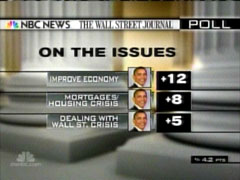 As for the NBC News/Wall Street Journal poll, the head-to-head numbers didn't even excite NBC that much. Political Director Chuck Todd went over them in a Wednesday night preview on Nightly News, which did not lead the broadcast but came about 10 minutes into the program.
As for the NBC News/Wall Street Journal poll, the head-to-head numbers didn't even excite NBC that much. Political Director Chuck Todd went over them in a Wednesday night preview on Nightly News, which did not lead the broadcast but came about 10 minutes into the program.
After going through numbers showing how McCain "was getting clobbered on the economy over these past two weeks," Todd mentioned: "Oh, by the way, we did have a head-to-head number here, this narrow lead for Obama, 48 percent to 46. This is a slight change from our last poll, showing a little drift toward Obama."
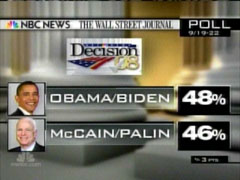 The next morning on Today, the discussion of the poll also downplayed the head-to-head match-up, and neither CBS nor ABC were excited enough by the narrow margin to mention any of their competitors findings.
The next morning on Today, the discussion of the poll also downplayed the head-to-head match-up, and neither CBS nor ABC were excited enough by the narrow margin to mention any of their competitors findings.
But the ABC poll has come under fire, both from the McCain campaign's pollster Bill McInturff and from Democratic pollster Peter Hart, who worked on the NBC News/Wall Street Journal poll, for over-sampling Democrats.
As MSNBC's "First Read" blog reported Wednesday morning: "Those identifying as Democrats in the ABC/Washington Post poll outweighed Republican by 16 points, a wider-than-usual number, McInturff said. 'It's way different than what other pollsters are showing,' McInturff said, citing many polls showing about a four-to-nine point Democratic Party ID advantage." See: firstread.msnbc.msn.com
After the NBC/Journal poll came out, Hart pointed out the same reason to doubt the ABC/Post poll:
The Journal/NBC News poll comes a day after a national poll conducted for the Washington Post and ABC News found Sen. Obama with a nine-point lead. Mr. Hart, the Journal's Democratic pollster, argued that these results were skewed because their sample included a disproportionate number of Democrats. Democrats had a 16-point advantage in the Post/ABC poll, which is considerably higher than most polls have found historically and this year.
The Journal/NBC poll found an eight-point advantage for Democrats.
See: online.wsj.com
In a posting to ABC's Web site, polling director Gary Langer defended his methodology:
Partisanship is measured by asking if people think of themselves as Democrats, Republicans or independents. That's unleaned party ID. A next step is to ask independents which party they lean toward. That's leaned party ID.
Unleaned party ID is more telling -- it's more rooted in actual partisan sentiment; it lets us look separately at independents, the quintessential swing voters; and it's the number that's comparable to what we learn from the exit polls on Election Day.
As noted, unleaned party ID among likely voters in our latest poll is 37-30 percent. Its average since we started following likely voters in June has been about the same, 36-31 percent. Among the broader population of registered voters it's 38-28 percent, exactly matching its 2008 average in ABC/Post polls. Our leaned party ID among registered voters, also as noted, is 54-38 percent. Among likely voters it's 52-41 percent.
See: blogs.abcnews.com
The real question is whether the ABC poll that so titillated the media is the first sign of a pro-Obama trend, or merely a stray data point in a statistically-tied horse race. Both ABC/Post and NBC/Journal looked at relatively few voters (780 likely voters and 1085 registered voters, respectively) compared to the big Gallup and Rasmussen tracking polls that present a three-day rolling average of 2,700 and 3,000 voters every day.
And those polls have shown no sign of validating the big swing towards Obama that ABC/Post theorized. As of Friday morning, Rasmussen shows a five-point advantage for Obama, while Gallup has them tied at 46% each. Friday's RealClearPolitics average showed a 3.7 percent advantage for Obama -- a clear swing from the trend of two weeks ago, but hardly an affirmation of ABC's numbers: www.realclearpolitics.com
But as the knee-jerk reaction to the ABC News/Washington Post poll shows, the media's interest in individual polls has less to do with an appreciation of their carefulness or exhaustiveness than with their ability to generate a sensational (pro-Obama) storyline.
  Cafferty Exhibiting Palin Derangement Cafferty Exhibiting Palin Derangement
Syndrome, Scolds Blitzer
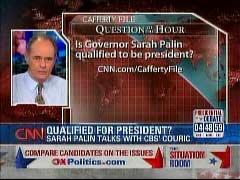 CNN commentator Jack Cafferty has full-blown Palin Derangement Syndrome. In his latest slam of the Republican vice presidential candidate on Friday's The Situation Room, Cafferty labeled Palin's interview with CBS's Katie Couric "one of the most pathetic pieces of tape I have ever seen from someone aspiring to one of the highest offices in this country," after he played a clip of the Alaska Governor making an awkward reply to a question. He then asked: "Is Governor Sarah Palin qualified to be President?" When host Wolf Blitzer replied to this comment by stating that "she's cramming a lot of information," Cafferty blasted back: "There's no excuse for that! She's supposed to know a little bit of this....You know, don't make excuses for her! That's pathetic." Of course, the CNN commentator only read negative replies to his question near the end of the 4 pm Eastern hour of the CNN program.
CNN commentator Jack Cafferty has full-blown Palin Derangement Syndrome. In his latest slam of the Republican vice presidential candidate on Friday's The Situation Room, Cafferty labeled Palin's interview with CBS's Katie Couric "one of the most pathetic pieces of tape I have ever seen from someone aspiring to one of the highest offices in this country," after he played a clip of the Alaska Governor making an awkward reply to a question. He then asked: "Is Governor Sarah Palin qualified to be President?" When host Wolf Blitzer replied to this comment by stating that "she's cramming a lot of information," Cafferty blasted back: "There's no excuse for that! She's supposed to know a little bit of this....You know, don't make excuses for her! That's pathetic." Of course, the CNN commentator only read negative replies to his question near the end of the 4 pm Eastern hour of the CNN program.
[This item, by the MRC's Matthew Balan, was posted Friday evening on the MRC's blog, NewsBusters.org: newsbusters.org ]
Since McCain named Palin as his running mate on August 29, Cafferty has devoted 35 percent of his "Questions of the Hour" on The Situation Room to the Alaska Governor, or about once a day. He asked on that very day whether "John McCain undercut his own message by naming someone even younger and more inexperienced than Barack Obama to be his running mate?" During the 15 broadcast days that he has been present on the CNN program since the announcement, there has only been one day where he didn't mention her during one of his three daily "Cafferty File" segments -- September 25. As early as September 3, he asked: "Should John McCain consider replacing Sarah Palin on the GOP ticket?" The day before, he asked whether Palin had been "properly vetted before being named John McCain's V.P."
Only 4 out of the 14 "Cafferty File" segments which he has devoted to Palin have been more neutral. On September 3, the same day he asked whether McCain should consider replacing the Alaska governor, he asked, "What do you hope to learn about Sarah Palin from her speech tonight?" After taking several days off from CNN due to the death of his wife, Cafferty returned on September 15 to ask, "Which woman has more credibility with the average American, Sara Palin or Hillary Clinton?" On September 22, he wondered, "What will Sarah Palin and Hamid Karzai talk about?" The following day, he offered a question with a hint of lament: "What does it say that Sarah Palin is meeting with heads of state at the UN while Hillary Clinton is hosting Farm Day?"
 Cafferty used the remaining six "Cafferty File" segments to cast doubt on Palin's candidacy. On September 4, he stated that "when it came to solutions to America's myriad problems, Palin was noticeably lacking." He then asked as his "Question of the Hour," "Does Sarah Palin help or hurt John McCain's chances of becoming president?" Twelve days later on September 16, after detailing how her husband and several of her aides had been subpoenaed in the so-called Troopergate investigation, he asked, "What does it mean that Gov. Sarah Palin is refusing to cooperate with the investigation into the firing of her public safety commissioner?" Cafferty used the remaining six "Cafferty File" segments to cast doubt on Palin's candidacy. On September 4, he stated that "when it came to solutions to America's myriad problems, Palin was noticeably lacking." He then asked as his "Question of the Hour," "Does Sarah Palin help or hurt John McCain's chances of becoming president?" Twelve days later on September 16, after detailing how her husband and several of her aides had been subpoenaed in the so-called Troopergate investigation, he asked, "What does it mean that Gov. Sarah Palin is refusing to cooperate with the investigation into the firing of her public safety commissioner?"
The following day, the CNN commentator quoted from a prominent liberal columnist to criticize governor's popularity: "In today's New York Times, columnist Maureen Dowd suggests the Palin phenomenon is like a trip back to junior high school...where the popular girl gets all the attention." His "Question of the Hour" in response: "What does it say about us that Sarah Palin is attracting more attention than the two men who would be president?" Cafferty concluded that week by bringing up the Troopergate investigation on September 18's Situation Room and by asking whether "Sarah Palin's 15 minutes of fame" was over on September 19.
Before taking his day-long hiatus from talking about Palin on September 25, Cafferty ripped into the McCain campaign for not allowing reporters to have more access to the Alaska governor: "Yesterday's photo op at the United Nations between Sarah Palin and Afghan President Hamid Karzai was a joke." But on this occasion, he didn't directly criticize Palin.
Cafferty took much more time to criticize Palin's opponent, Joe Biden. In fact, the first time that he said anything critical of the Democratic vice presidential candidate during his "Cafferty File" segment was on Friday's Situation Room. The CNN commentator, during the 6 pm Eastern hour of the CNN program, detailed the Delaware Senator's recent gaffe during a recent interview with Couric in which he claimed, "When the stock market crashed [in 1929], Franklin D. Roosevelt got on the television and didn't just talk about the, you know, the princes of greed. He said, 'Look, here's what happened.'" Herbert Hoover was President, not Roosevelt; and television didn't yet exist as a news medium. The CNN commentator then pondered: "Is Joe Biden an asset or a liability for Barack Obama?"
  ABC's David Muir Has Trouble Finding ABC's David Muir Has Trouble Finding
Republicans in Mississippi
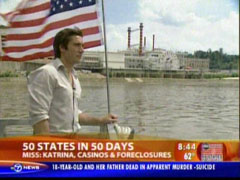 Good Morning America reporter David Muir on Friday reported live from Mississippi and somehow managed to not feature a single supporter of Senator John McCain, despite the fact that a Research 2000 poll found the Republican candidate maintaining an 18 point lead in the state. In the only allusion to that, Muir began, "In a state considered deeply red, John McCain has family roots here." He then highlighted an Obama supporter: "But those ties aren't enough for Heidi Burell, whose own son is in the Navy. She wants the war to end." In a clip, Ms. Burell hoped that America will regain "respect in the world community."
Good Morning America reporter David Muir on Friday reported live from Mississippi and somehow managed to not feature a single supporter of Senator John McCain, despite the fact that a Research 2000 poll found the Republican candidate maintaining an 18 point lead in the state. In the only allusion to that, Muir began, "In a state considered deeply red, John McCain has family roots here." He then highlighted an Obama supporter: "But those ties aren't enough for Heidi Burell, whose own son is in the Navy. She wants the war to end." In a clip, Ms. Burell hoped that America will regain "respect in the world community."
Muir featured Mississippi resident Todd Molino who stated, "You see it everywhere you look, health care has become unaffordable." The reporter also described an elderly couple: "And it's health care that worries Buddy and Marilyn Hardy who can't afford to buy their prescription drugs." However, despite asserting that the individuals he spoke to were "divided on their pick for president," no enthusiastic McCain backers were featured.
[This item, by the MRC's Scott Whitlock, was posted Tuesday afternoon on the MRC's blog, NewsBusters.org: newsbusters.org ]
Muir's report was part of ABC's "50 States in 50 Days" series that is airing on various ABC News programs. His reports from Arkansas on Wednesday and Illinois on Tuesday were more balanced. The latter segment featured both Obama and McCain voters. Muir even talked to a voter who worried about taxes on small businesses.
A transcript of the September 26 segment, which aired at 8:43am, follows:
DIANE SAWYER: Now, come travel the country with us. Our special 50 states in 50 days election coverage. And this week, as you know, David Muir has been making his way down the Mississippi, stopping in Illinois on Wednesday, Arkansas yesterday. This morning, he is in Mississippi, where John McCain and Barack Obama are supposed to hold their first presidential debate tonight at Ol' Miss University. And right now, he's in Vicksburg. David, good morning.
DAVID MUIR: Ahoy to you, Diane, from this beautiful river boat in Vicksburg. What a beautiful place this is. This boat actually a key to the economy here. And we'll tell you why in just a second. We thought we'd end our Mississippi tour here in this state, because it's the first to hold the first presidential debate. Who knew there would be a debate over the debate. But regardless, the people here wish they were asking the questions. As we travel down the Mighty Mississippi, it was hard to miss, what appeared to be a grand river boat from a bygone era. Instead, it is a sign of a new one. It is one of four casinos in historical Vicksburg, offering a much-needed shot in the arm here. The city has collected $7 million in tax revenue from these casinos so far this year. It does help. But it doesn't solve high prices at the gas pump or the grocery store. Here, the economy weighs heavily. So, are you thinking about your baby as you try to make up your mind?
BESS AVERETT (Vicksburg, Mississippi mom): Oh, absolutely. It's hard not think about her this morning.
MUIR: Born and raised in Vicksburg, Beth Averett is about to expand her family here.
AVERETT: I don't like having to spend all my money on milk and diapers. And, so, the economy is a hot topic for me.
MUIR: In a state considered deeply red, John McCain has family roots here. His great-grandfather lived in Mississippi. His grandfather went to the University of Mississippi. But those ties aren't enough for Heidi Burell, whose own son is in the navy. She wants the war to end.
HEIDI BURELL (Port Gibson, Mississippi mom): I'm hoping we regain respect in the world community.
UNIDENTIFIED OFF CAMERA VOICE: Change may not always be good.
MUIR: Inside this home built back in 1880, a legendary restaurant. You have to bring your appetite and the opinion. Why the chicken here?
SECOND UNIDENTIFIED FEMALE The crust is so good and crispy.
MUIR: These voters love their city. But they see what's happening here. Mortgage delinquencies in Mississippi are the highest in the nation.
ROBERT WARE (Real estate developer): Our deficit is are higher than it's ever been. And a lot of people are losing their homes.
TODD MOLINO (Hotel developer): You see it everywhere you look, health care has become unaffordable.
MUIR: And it's health care that worries Buddy and Marilyn Hardy who can't afford to buy their prescription drugs.
BUDDY HARDY (72-years old): Even though they're made in the United States, we buy them out of Canada. And they're cheap and more affordable. MUIR: Americans spend an estimated $1.5 million on drugs from Canada, every year. This group is divided on their pick for president. But they were unanimous on one issue, energy.
NELDA SAMPEY (Banker): Quit being dependent on third-world, you know, countries that are holding us hostage for the economy. MUIR: And they may hear about some of those issues, may, in this debate over foreign policy tonight. We'll keep our eyes on that. But, check this out, Diane and Robin. This is Robin Roberts country, here in Mississippi. And this morning, before I could get out of the room, while I was getting ready, I heard this rumbling outside. Is this what you got on the whistle-stop tour all last week? I mean, this was an incredible welcome. They basically were the alarm clock this morning. These folks out ready to be out here to say hey to GMA. And so many signs saying hi to Diane and Robin. So, I feel like I'm the GMA ambassador down here.
ROBERTS: You're doing a good job, David. Give my love to all my home folks down in Mississippi. So much to be proud of in that state. And tourism still a very positive factor there in Vicksburg and on the Mississippi Gulf Coast where I grew up. And hotel inventory's about 70 percent what they were pre-Katrina. And there's still new hotels that are going to be opening up by next summer. So, a lot of positive things going on down there.
  SNL Parodies Rezko and Other Obama Scandals SNL Parodies Rezko and Other Obama Scandals
Ignored by Media
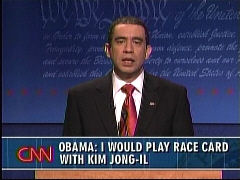 When the latest installment of Saturday Night Live parodied Friday's presidential debate, the NBC comedy program gave attention to Barack Obama's connections to convicted criminal Tony Rezko, corrupt Chicago politics, and Obama's recent attempts at "playing the race card," which notably are all matters that the mainstream news media have given little attention. While the show also took a number of shots at John McCain, several times having him propose a bizarre gimmick like challenging Obama to a pie-eating contest, the Illinois Senator also received several noteworthy jabs. One line involved McCain's character, played by Darrell Hammond, referring to Obama, played by Fred Armisen, as making an earmark request titled "Tony Rezko Hush Money." Obama's character also bragged that his tax cut plan would benefit Chicago politicians and city employees "because my plan would not tax income from bribes, kickbacks, shakedowns, embezzlement of government funds, or extortion." When the latest installment of Saturday Night Live parodied Friday's presidential debate, the NBC comedy program gave attention to Barack Obama's connections to convicted criminal Tony Rezko, corrupt Chicago politics, and Obama's recent attempts at "playing the race card," which notably are all matters that the mainstream news media have given little attention. While the show also took a number of shots at John McCain, several times having him propose a bizarre gimmick like challenging Obama to a pie-eating contest, the Illinois Senator also received several noteworthy jabs. One line involved McCain's character, played by Darrell Hammond, referring to Obama, played by Fred Armisen, as making an earmark request titled "Tony Rezko Hush Money." Obama's character also bragged that his tax cut plan would benefit Chicago politicians and city employees "because my plan would not tax income from bribes, kickbacks, shakedowns, embezzlement of government funds, or extortion."
The Obama character later promised that he would "play the race card" against dictators like North Korean President Kim Jong Il if necessary to guilt-trip them into dismantling their nuclear programs, as he would accuse Kim of refusing to cooperate with him because "I'm not like the other guys on the $5 and $10 bills."
[This item, by the MRC;s Brad Wilmouth, was posted late Saturday night on the MRC's blog, NewsBusters.org: newsbusters.org ]
The MRC's March 3 Media Reality Check documented the media's scant interest in the trial of corrupt Chicago businessman Tony Rezko, an Obama supporter whose wife assisted in a deal by which the Obama's purchased a $1.6 million home: www.mediaresearch.org
And the joke about Obama "playing the race card," which is primarily based on a line Obama used to employ regularly as a laugh line during appearances until he was called out by Senator McCain for the joke's suggestion that McCain's campaign was using racism. But the line could also be considered apropos to Obama's recent effort to "play the race card" as his campaign distorted statements by Rush Limbaugh to accuse the conservative talk radio host of racism and to try to link the comments to Senator McCain. The media's lack of interest in this story was documented in the September 23 Worst of the Week: www.mrc.org
Below is a transcript of relevant portions of the September 27 Saturday Night Live parody of the debate:
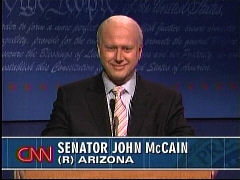 JOHN MCCAIN, PLAYED BY DARRELL HAMMOND: Jim, what the American people need to understand, and what Senator Obama does not understand, is that the real problem here is excessive government spending, especially congressional earmarks and pork barrel projects....And how about this? $8.2 million for something called "Tony Rezko Hush Money."
JOHN MCCAIN, PLAYED BY DARRELL HAMMOND: Jim, what the American people need to understand, and what Senator Obama does not understand, is that the real problem here is excessive government spending, especially congressional earmarks and pork barrel projects....And how about this? $8.2 million for something called "Tony Rezko Hush Money."
BARACK OBAMA, PLAYED BY FRED ARMISEN: John, I withdrew that earmark right after [UNCLEAR WHETHER ARMISEN SAYS "I" OR "he"] began cooperating with prosecutors, and I think you know that.
MCCAIN: Senator, the fact is, to fund all the other programs, your planning will require a massive tax increase.
OBAMA: John, once again, you're not being truthful about my proposals. Under my tax plan, not only would every American making less than $250,000 per year get a tax cut, so would most members of the Chicago City Council, as well as city building inspectors. That's because my plan would not tax income from bribes, kickbacks, shakedowns, embezzlement of government funds, or extortion.
...
JIM LEHRER CHARACTER: Now, let's turn to the topic of nuclear proliferation. Senator Obama, you have frequently been critical of this administration's efforts to stop Iran and North Korea's nuclear weapons programs.
OBAMA: I have.
LEHRER: What would you do differently.
OBAMA: First of all, Jim, I would use traditional diplomacy, something this administration has consistently refused to do. Should that fail, then and only then, would I try what I call "playing the race card." [LAUGHTER]
LEHRER: And how would that work?
OBAMA: Take North Korea. I would ask Kim Jong Il to shut down his country's nuclear weapons program. If he declined, I would say to him, "All right, I get it. I know why you're really refusing to stop the program." And he would say, "No, what are you talking about?" And I would say, "It's because I don't look like all the other Presidents you've dealt with." And then he would say, "Wait, that's not fair. That has nothing to do with it." And I would add, "That's cool. I understand. I'm different. I'm not like the other guys on the $5 and $10 bills." It's a long, delicate process. But eventually, he'll have to give in.
-- Brent Baker

Home | News Division
| Bozell Columns | CyberAlerts
Media Reality Check | Notable Quotables | Contact
the MRC | Subscribe
|



























 Awarding Barack Obama two grades of A-minus and one B-minus while presenting John McCain with two grades of B-plus and one B-minus, at the end of his "Nightline Report Card" segment on Friday night, ABC's George Stephanopoulos declared Obama the "winner" -- with a big illustrative check mark on screen: "Bottom line, the winner is Barack Obama. He comes into this race where the country wants change. His number one goal was to show that he belonged on that stage. He was a credible commander-in-chief, that he could hold his own on national security. He did that tonight. He gets the win."
Awarding Barack Obama two grades of A-minus and one B-minus while presenting John McCain with two grades of B-plus and one B-minus, at the end of his "Nightline Report Card" segment on Friday night, ABC's George Stephanopoulos declared Obama the "winner" -- with a big illustrative check mark on screen: "Bottom line, the winner is Barack Obama. He comes into this race where the country wants change. His number one goal was to show that he belonged on that stage. He was a credible commander-in-chief, that he could hold his own on national security. He did that tonight. He gets the win."  In assessing "strategy," Stephanopoulos trumpeted Obama's performance: "Even better was overcoming the bar on commander-in-chief. He comes in at a significant disadvantage on commander-in-chief. People wonder whether he as this experience to be President, to handle national security and I think on answer after answer after answer, he showed confidence, he showed toughness and he showed he belonged on that stage."
In assessing "strategy," Stephanopoulos trumpeted Obama's performance: "Even better was overcoming the bar on commander-in-chief. He comes in at a significant disadvantage on commander-in-chief. People wonder whether he as this experience to be President, to handle national security and I think on answer after answer after answer, he showed confidence, he showed toughness and he showed he belonged on that stage."  STEPHANOPOULOS: Again, Barack Obama A-minus, John McCain B-plus. Let's take McCain first. He did do a good job. As you pointed out in your piece, he was crisp and he was declarative. I also thought he did a very good job at bringing out emotion over the course of the debate in telling stories, weaving that. But, and I want to show some of this here, John McCain tended not to look either at his opponent, Barack Obama, or at the camera. He tended to address Jim Lehrer so he wasn't looking at the camera. Look at Barack Obama: He looked straight at the camera, he also was willing to engage John McCain again and again and I think he got the advantage there, so A-minus for Barack Obama, B-plus for McCain.
STEPHANOPOULOS: Again, Barack Obama A-minus, John McCain B-plus. Let's take McCain first. He did do a good job. As you pointed out in your piece, he was crisp and he was declarative. I also thought he did a very good job at bringing out emotion over the course of the debate in telling stories, weaving that. But, and I want to show some of this here, John McCain tended not to look either at his opponent, Barack Obama, or at the camera. He tended to address Jim Lehrer so he wasn't looking at the camera. Look at Barack Obama: He looked straight at the camera, he also was willing to engage John McCain again and again and I think he got the advantage there, so A-minus for Barack Obama, B-plus for McCain.  MORAN: Bottom line?
MORAN: Bottom line? 
 In the 20 minutes of post-debate analysis before the broadcast networks ended coverage and the cable channels moved on to other shows Friday night, on MSNBC Chris Matthews and Andrea Mitchell fretted that Barack Obama wasn't tough enough in attacking John McCain on the economy as Mitchell also hailed Obama -- "But, boy, he did show a command of foreign policy in terms of the nuts and bolts of it" -- and regretted Obama didn't do more to tie McCain to George Bush, a theme echoed on NBC by Tom Brokaw who "was surprised he didn't work harder at pinning John McCain to the eight years of the Bush administration." CBS featured only one citizen reaction, a man who touted Obama and compared McCain to Nixon, before ending with a quickie poll (neither ABC or NBC had one) that found twice as many "uncommitted voters" thought Obama won (40 percent) than McCain (22 percent).
In the 20 minutes of post-debate analysis before the broadcast networks ended coverage and the cable channels moved on to other shows Friday night, on MSNBC Chris Matthews and Andrea Mitchell fretted that Barack Obama wasn't tough enough in attacking John McCain on the economy as Mitchell also hailed Obama -- "But, boy, he did show a command of foreign policy in terms of the nuts and bolts of it" -- and regretted Obama didn't do more to tie McCain to George Bush, a theme echoed on NBC by Tom Brokaw who "was surprised he didn't work harder at pinning John McCain to the eight years of the Bush administration." CBS featured only one citizen reaction, a man who touted Obama and compared McCain to Nixon, before ending with a quickie poll (neither ABC or NBC had one) that found twice as many "uncommitted voters" thought Obama won (40 percent) than McCain (22 percent).  Following Douglass, Matthews went to NBC News reporter Andrea Mitchell, who rued: "I think he should have turned away from taxes and earmarks very quickly and really hammered away on George Bush and on what this $700 billion or $1 trillion problem really means for average people."
Following Douglass, Matthews went to NBC News reporter Andrea Mitchell, who rued: "I think he should have turned away from taxes and earmarks very quickly and really hammered away on George Bush and on what this $700 billion or $1 trillion problem really means for average people."  To end the 20 minutes, just before 11 PM EDT anchor Katie Couric went to Sharyl Attkisson for results from a CBS News/Knowledge Networks "poll of approximately 500 uncommitted voters." She highlighted several results, starting with how on who won 40 percent said Obama, 22 percent replied McCain and 38 percent considered it a tie; and ending with how 46 percent said their opinion of Barack Obama has gotten better compared to just 7 percent whose opinion grew worse.
To end the 20 minutes, just before 11 PM EDT anchor Katie Couric went to Sharyl Attkisson for results from a CBS News/Knowledge Networks "poll of approximately 500 uncommitted voters." She highlighted several results, starting with how on who won 40 percent said Obama, 22 percent replied McCain and 38 percent considered it a tie; and ending with how 46 percent said their opinion of Barack Obama has gotten better compared to just 7 percent whose opinion grew worse. 
 During late night coverage of Friday's presidential debate between Senators Barack Obama and John McCain, Hardball host Chris Matthews attacked the Republican for showing both "contempt" and an "inferiority complex" towards his Democratic opponent. The MSNBC host asked liberal Washington Post columnist Eugene Robinson: "What do you make of what I take as contempt? And I'm not sure contempt is an admirable trait when you're up against an opponent who has every right to be there against you, in fact has equal footing."
During late night coverage of Friday's presidential debate between Senators Barack Obama and John McCain, Hardball host Chris Matthews attacked the Republican for showing both "contempt" and an "inferiority complex" towards his Democratic opponent. The MSNBC host asked liberal Washington Post columnist Eugene Robinson: "What do you make of what I take as contempt? And I'm not sure contempt is an admirable trait when you're up against an opponent who has every right to be there against you, in fact has equal footing." 
 Ironically, about 14 minutes after Matthews's criticism that McCain was "crunched over," former Democratic Congressman and MSNBC political analyst Harold Ford advised Obama to "lean forward a little more." Ford: "One of the things that Senator Obama has probably got to do better going forward here and even in the next debate, is lean forward a little more. It's funny because, interestingly, because his running mate, Joe Biden, has probably got to lean back just a little bit in his debate with Sarah Palin."
Ironically, about 14 minutes after Matthews's criticism that McCain was "crunched over," former Democratic Congressman and MSNBC political analyst Harold Ford advised Obama to "lean forward a little more." Ford: "One of the things that Senator Obama has probably got to do better going forward here and even in the next debate, is lean forward a little more. It's funny because, interestingly, because his running mate, Joe Biden, has probably got to lean back just a little bit in his debate with Sarah Palin."  CHRIS MATTHEWS: What struck me is the stylistic difference. He was very strong. He was very strong, McCain, very practical, very emotional He hit a lot of people as a very practical man tonight. He may not have been presidential, however. Not once tonight, in an hour and a half, did he look at his opponent. He was crunched over, almost grumpy in his physical manner. I think a lot of people will take that body language as contemptuous of his opponent. They won't like it. Barack Obama, on the other hand, who kept agreeing with McCain, over and over again, saying I agree with the point you made, I agree with the point you made, looked more presidential, although I believe on points, he gave away too much. I want to bring in Andrea Mitchell right now with your thoughts.
CHRIS MATTHEWS: What struck me is the stylistic difference. He was very strong. He was very strong, McCain, very practical, very emotional He hit a lot of people as a very practical man tonight. He may not have been presidential, however. Not once tonight, in an hour and a half, did he look at his opponent. He was crunched over, almost grumpy in his physical manner. I think a lot of people will take that body language as contemptuous of his opponent. They won't like it. Barack Obama, on the other hand, who kept agreeing with McCain, over and over again, saying I agree with the point you made, I agree with the point you made, looked more presidential, although I believe on points, he gave away too much. I want to bring in Andrea Mitchell right now with your thoughts. 
 Watching Saturday's network morning shows, the talking heads seemed to agree that Friday night's debate did not produce "a clear winner" or any "knockout punch," and that it was unlikely that any "needle was moved" among undecided voters. Yet those same networks tried to also argue that Obama had really won the debate, superficially suggesting that McCain's "disdainful" body language poorly contrasted with the "warm" and "deferential" Obama.
Watching Saturday's network morning shows, the talking heads seemed to agree that Friday night's debate did not produce "a clear winner" or any "knockout punch," and that it was unlikely that any "needle was moved" among undecided voters. Yet those same networks tried to also argue that Obama had really won the debate, superficially suggesting that McCain's "disdainful" body language poorly contrasted with the "warm" and "deferential" Obama.  The only other network to poll a random sample last night was CBS, which selected 483 "previously uncommitted" voters to respond via the Internet. Saturday's Early Show twice touted the results of that poll, but the numbers were inexplicably different than those announced by CBS Friday night when CBS had Obama "winning" by a 40% to 22% margin (see #2 above); by this morning, the poll results had curiously changed to 39% for Obama and 24% for McCain.
The only other network to poll a random sample last night was CBS, which selected 483 "previously uncommitted" voters to respond via the Internet. Saturday's Early Show twice touted the results of that poll, but the numbers were inexplicably different than those announced by CBS Friday night when CBS had Obama "winning" by a 40% to 22% margin (see #2 above); by this morning, the poll results had curiously changed to 39% for Obama and 24% for McCain.  JEFFREY TOOBIN: What is significant, I think, about these polls is there tends to be a multiplier effect when these -- about these debates. That, initially, people aren't quite sure, but once one side is established as the winner, it becomes a self-fulfilling prophecy....It is very important, I think, that the first objective analysis -- you know, not from us, but from polls, and I think it's consistent across the networks -- all show Obama winning.
JEFFREY TOOBIN: What is significant, I think, about these polls is there tends to be a multiplier effect when these -- about these debates. That, initially, people aren't quite sure, but once one side is established as the winner, it becomes a self-fulfilling prophecy....It is very important, I think, that the first objective analysis -- you know, not from us, but from polls, and I think it's consistent across the networks -- all show Obama winning.  DOWD: Yeah, that was an interesting thing. Most, you know -- debates are judged by the American public by substance and by style and how you connect with the audience. And I think on that regard, Barack Obama did a much better job. He, as you say, he looked at the camera. He smiled. He actually, you know, gave John McCain -- he said 'John McCain is right' a number of times. John McCain never said that to Barack Obama. And just his body language was, he was not going to look -- either somebody told him or he decided he was not going to look at Barack Obama. And I don't think in a debate, in front of the American public, that is a good thing. They want somebody that warms up. And I think Barack Obama did that.
DOWD: Yeah, that was an interesting thing. Most, you know -- debates are judged by the American public by substance and by style and how you connect with the audience. And I think on that regard, Barack Obama did a much better job. He, as you say, he looked at the camera. He smiled. He actually, you know, gave John McCain -- he said 'John McCain is right' a number of times. John McCain never said that to Barack Obama. And just his body language was, he was not going to look -- either somebody told him or he decided he was not going to look at Barack Obama. And I don't think in a debate, in front of the American public, that is a good thing. They want somebody that warms up. And I think Barack Obama did that. 

 Wednesday morning, ABC News and the Washington Post released a new poll showing Barack Obama leading John McCain by 9 points, 52 to 43 percent. The next day, NBC News and the Wall Street Journal released a poll showing a much tighter race: 48 percent for Obama, 46 percent for McCain.
Wednesday morning, ABC News and the Washington Post released a new poll showing Barack Obama leading John McCain by 9 points, 52 to 43 percent. The next day, NBC News and the Wall Street Journal released a poll showing a much tighter race: 48 percent for Obama, 46 percent for McCain.  The ABC poll was so thrilling to journalists, it was also part of the political discussion on CBS and NBC that same morning. CBS's Harry Smith confronted Republican Karen Hughes: "We look at brand new poll numbers this morning, nationwide poll numbers, and all of a sudden Barack Obama has jumped out to this nine-point lead."
The ABC poll was so thrilling to journalists, it was also part of the political discussion on CBS and NBC that same morning. CBS's Harry Smith confronted Republican Karen Hughes: "We look at brand new poll numbers this morning, nationwide poll numbers, and all of a sudden Barack Obama has jumped out to this nine-point lead."  As for the NBC News/Wall Street Journal poll, the head-to-head numbers didn't even excite NBC that much. Political Director Chuck Todd went over them in a Wednesday night preview on Nightly News, which did not lead the broadcast but came about 10 minutes into the program.
As for the NBC News/Wall Street Journal poll, the head-to-head numbers didn't even excite NBC that much. Political Director Chuck Todd went over them in a Wednesday night preview on Nightly News, which did not lead the broadcast but came about 10 minutes into the program.  The next morning on Today, the discussion of the poll also downplayed the head-to-head match-up, and neither CBS nor ABC were excited enough by the narrow margin to mention any of their competitors findings.
The next morning on Today, the discussion of the poll also downplayed the head-to-head match-up, and neither CBS nor ABC were excited enough by the narrow margin to mention any of their competitors findings. 
 CNN commentator Jack Cafferty has full-blown Palin Derangement Syndrome. In his latest slam of the Republican vice presidential candidate on Friday's The Situation Room, Cafferty labeled Palin's interview with CBS's Katie Couric "one of the most pathetic pieces of tape I have ever seen from someone aspiring to one of the highest offices in this country," after he played a clip of the Alaska Governor making an awkward reply to a question. He then asked: "Is Governor Sarah Palin qualified to be President?" When host Wolf Blitzer replied to this comment by stating that "she's cramming a lot of information," Cafferty blasted back: "There's no excuse for that! She's supposed to know a little bit of this....You know, don't make excuses for her! That's pathetic." Of course, the CNN commentator only read negative replies to his question near the end of the 4 pm Eastern hour of the CNN program.
CNN commentator Jack Cafferty has full-blown Palin Derangement Syndrome. In his latest slam of the Republican vice presidential candidate on Friday's The Situation Room, Cafferty labeled Palin's interview with CBS's Katie Couric "one of the most pathetic pieces of tape I have ever seen from someone aspiring to one of the highest offices in this country," after he played a clip of the Alaska Governor making an awkward reply to a question. He then asked: "Is Governor Sarah Palin qualified to be President?" When host Wolf Blitzer replied to this comment by stating that "she's cramming a lot of information," Cafferty blasted back: "There's no excuse for that! She's supposed to know a little bit of this....You know, don't make excuses for her! That's pathetic." Of course, the CNN commentator only read negative replies to his question near the end of the 4 pm Eastern hour of the CNN program.  Cafferty used the remaining six "Cafferty File" segments to cast doubt on Palin's candidacy. On September 4, he stated that "when it came to solutions to America's myriad problems, Palin was noticeably lacking." He then asked as his "Question of the Hour," "Does Sarah Palin help or hurt John McCain's chances of becoming president?" Twelve days later on September 16, after detailing how her husband and several of her aides had been subpoenaed in the so-called Troopergate investigation, he asked, "What does it mean that Gov. Sarah Palin is refusing to cooperate with the investigation into the firing of her public safety commissioner?"
Cafferty used the remaining six "Cafferty File" segments to cast doubt on Palin's candidacy. On September 4, he stated that "when it came to solutions to America's myriad problems, Palin was noticeably lacking." He then asked as his "Question of the Hour," "Does Sarah Palin help or hurt John McCain's chances of becoming president?" Twelve days later on September 16, after detailing how her husband and several of her aides had been subpoenaed in the so-called Troopergate investigation, he asked, "What does it mean that Gov. Sarah Palin is refusing to cooperate with the investigation into the firing of her public safety commissioner?" 
 Good Morning America reporter David Muir on Friday reported live from Mississippi and somehow managed to not feature a single supporter of Senator John McCain, despite the fact that a Research 2000 poll found the Republican candidate maintaining an 18 point lead in the state. In the only allusion to that, Muir began, "In a state considered deeply red, John McCain has family roots here." He then highlighted an Obama supporter: "But those ties aren't enough for Heidi Burell, whose own son is in the Navy. She wants the war to end." In a clip, Ms. Burell hoped that America will regain "respect in the world community."
Good Morning America reporter David Muir on Friday reported live from Mississippi and somehow managed to not feature a single supporter of Senator John McCain, despite the fact that a Research 2000 poll found the Republican candidate maintaining an 18 point lead in the state. In the only allusion to that, Muir began, "In a state considered deeply red, John McCain has family roots here." He then highlighted an Obama supporter: "But those ties aren't enough for Heidi Burell, whose own son is in the Navy. She wants the war to end." In a clip, Ms. Burell hoped that America will regain "respect in the world community." 
 When the latest installment of Saturday Night Live parodied Friday's presidential debate, the NBC comedy program gave attention to Barack Obama's connections to convicted criminal Tony Rezko, corrupt Chicago politics, and Obama's recent attempts at "playing the race card," which notably are all matters that the mainstream news media have given little attention. While the show also took a number of shots at John McCain, several times having him propose a bizarre gimmick like challenging Obama to a pie-eating contest, the Illinois Senator also received several noteworthy jabs. One line involved McCain's character, played by Darrell Hammond, referring to Obama, played by Fred Armisen, as making an earmark request titled "Tony Rezko Hush Money." Obama's character also bragged that his tax cut plan would benefit Chicago politicians and city employees "because my plan would not tax income from bribes, kickbacks, shakedowns, embezzlement of government funds, or extortion."
When the latest installment of Saturday Night Live parodied Friday's presidential debate, the NBC comedy program gave attention to Barack Obama's connections to convicted criminal Tony Rezko, corrupt Chicago politics, and Obama's recent attempts at "playing the race card," which notably are all matters that the mainstream news media have given little attention. While the show also took a number of shots at John McCain, several times having him propose a bizarre gimmick like challenging Obama to a pie-eating contest, the Illinois Senator also received several noteworthy jabs. One line involved McCain's character, played by Darrell Hammond, referring to Obama, played by Fred Armisen, as making an earmark request titled "Tony Rezko Hush Money." Obama's character also bragged that his tax cut plan would benefit Chicago politicians and city employees "because my plan would not tax income from bribes, kickbacks, shakedowns, embezzlement of government funds, or extortion."  JOHN MCCAIN, PLAYED BY DARRELL HAMMOND: Jim, what the American people need to understand, and what Senator Obama does not understand, is that the real problem here is excessive government spending, especially congressional earmarks and pork barrel projects....And how about this? $8.2 million for something called "Tony Rezko Hush Money."
JOHN MCCAIN, PLAYED BY DARRELL HAMMOND: Jim, what the American people need to understand, and what Senator Obama does not understand, is that the real problem here is excessive government spending, especially congressional earmarks and pork barrel projects....And how about this? $8.2 million for something called "Tony Rezko Hush Money."